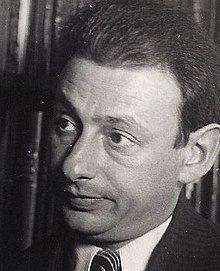Gershom Scholem
| Gershom Scholem | |
|---|---|
 Scholem, 1935 | |
| Lahir | Gerhard Scholem 5 Desember 1897 Berlin, Jerman |
| Meninggal | 21 Februari 1982 (umur 84) Yerusalem, Israel |
| Kebangsaan | Jerman Israel |
| Nama lain | גרשום שלום |
| Almamater | Universitas Frederick William |
| Suami/istri | Fania Freud Scholem |
| Penghargaan | Penghargaan Israel Penghargaan Bialik |
| Era | Filsafat abad ke-20 |
| Kawasan | Filsafat Jerman Filsafat Yahudi Filsafat Timur Tengah |
| Aliran | Filsafat Kontinental Kabbalah Wissenschaft des Judentums |
| Institusi | Universitas Ibrani Yerusalem |
Minat utama | Filsafat agama Filsafat sejarah Mistisisme Messianisme Zionisme |
Gerhard Scholem yang setelah berimigrasi dari Jerman ke Israel, berganti nama menjadi Gershom Scholem (Ibrani: גֵרְשׁׂם שָׁלוֹם) (5 Desember 1897 – 21 Februari 1982), adalah seorang filsafat dan sejarawan Israel kelahiran Jerman. Ia banyak dianggap sebagai akademisi kajian Kabbalah modern, menjadikannya Profesor Mistisisme Yahudi pertama di Universitas Ibrani Yerusalem.[1] Para sahabatnya meliputi Walter Benjamin dan Leo Strauss.
Catatan[sunting | sunting sumber]
- ^ Magid, Shaul, "Gershom Scholem" Diarsipkan 2019-04-20 di Wayback Machine., Stanford Encyclopedia of Philosophy (Spring 2009 Edition), Edward N. Zalta (ed.), URL = <http://plato.stanford.edu/archives/spr2009/entries/scholem/ Diarsipkan 2019-04-20 di Wayback Machine.>.
Bacaan tambahan[sunting | sunting sumber]
- Avriel Bar-Levav, On the Absence of a Book from a Library: Gershom Scholem and the Shulhan Arukh Diarsipkan 2019-04-20 di Wayback Machine.. Zutot: Perspectives on Jewish Culture 6 (2009): 71-73
- Engel Amir, Gershom Scholem: An Intellectual Biography Diarsipkan 2023-03-28 di Wayback Machine., University of Chicago Press, 2017.
- Biale, David. Gershom Scholem: Kabbalah and Counter-History, second ed., 1982.
- Bloom, Harold, ed. Gershom Scholem, 1987.
- Campanini, Saverio, A Case for Sainte-Beuve. Some Remarks on Gershom Scholem's Autobiography, in P. Schäfer - R. Elior (edd.), Creation and Re-Creation in Jewish Thought. Festschrift in Honor of Joseph Dan on the Occasion of his 70th Birthday, Tübingen 2005, pp. 363–400.
- Campanini, Saverio, Some Notes on Gershom Scholem and Christian Kabbalah, in Joseph Dan (ed.), Gershom Scholem in Memoriam, Jerusalem Studies in Jewish Thought, 21 (2007), pp. 13–33.
- [https://web.archive.org/web/20160303183246/http://www.humnet.unipi.it/medievistica/aisg/Materia-giudaica-2003/VIII-2%20del%202003/VIII2-265pp432.pdf Diarsipkan 2016-03-03 di Wayback Machine. F. Dal Bo, Between sand and stars: Scholem and his translation of Zohar 22a-26b [Ita.], in "Materia Giudaica", VIII, 2, 2003, pp. 297–309] – Analysis of Scholem's translation of Zohar I, 22a-26b
- Jacobson, Eric, Metaphysics of the Profane - The Political Theology of Walter Benjamin and Gershom Scholem, (Columbia University Press, NY, 2003).
- Lucca, Enrico, Between History and Philosophy of History. Comments on an unpublished Document by Gershom Scholem, in "Naharaim", v, 1-2 (2011), pp. 8–16.
- Lucca, Enrico, Gershom Scholem on Franz Rosenzweig and the Kabbalah. Introduction to the Text, in "Naharaim", vi, 1 (2012), pp. 7–19.
- Mirsky, Yehudah, "Gershom Scholem, 30 Years On Diarsipkan 2012-05-12 di Wayback Machine.", (Jewish Ideas Daily, 2012).
- Heller Wilensky, Sarah, See the letters from Joseph Weiss to Sarah Heller Wilensky in "Joseph Weiss, Letters to Ora" in A. Raoport-Albert (Ed.) Hasidism reappraised. London: Littman Press, 1977.
- Robinson, G. Essential Judaism, Pocket Books, 2000.
Pranala luar[sunting | sunting sumber]
Wikiquote memiliki koleksi kutipan yang berkaitan dengan: Gershom Scholem.
Wikimedia Commons memiliki media mengenai Gershom Scholem.
- Audio of Gershom Scholem lecturing on Kabbalah in 1975
- Biography at the Jewish Virtual Library Diarsipkan 2016-11-22 di Wayback Machine.
- "Gershom Scholem & the Study of Mysticism Diarsipkan 2023-03-28 di Wayback Machine.", MyJewishLearning.com
- Biographical page Diarsipkan 2022-11-29 di Wayback Machine. created by Sharon Naveh
